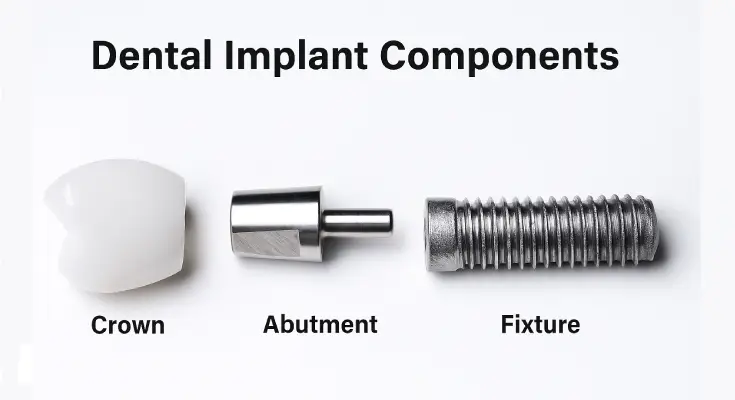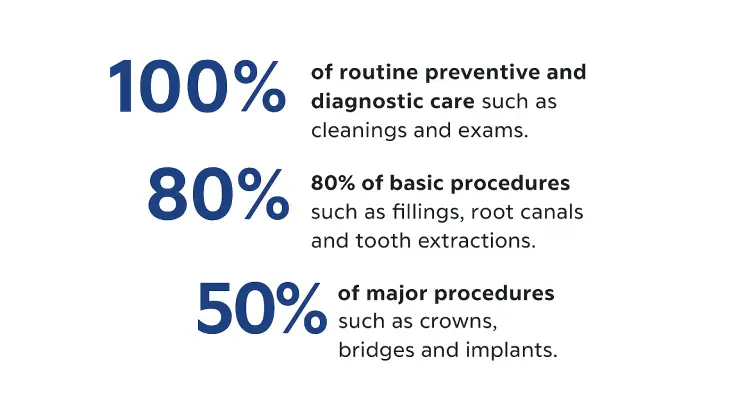Does Insurance Cover Dental Implants in NYC | Doctors Guide
If you’ve got missing teeth and need to fill the gaps to improve your quality of life, you may be considering dental implants. The question is “Does insurance cover dental implants?”
At 65 Broadway Dental, customers are confused about their insurance options for dental implants. This makes it essential for us to create a guide on insurance and dental implants.

Will Insurance Cover Dental Implants?
An accurate response to “Does insurance cover dental implants?” is maybe.
Many factors influence whether insurance covers dental implant procedures. Even different stages of the process and dental items have different coverage statuses.
According to insurance companies in NYC, implant procedures fall under the category of cosmetic dentistry. This means it’s not a medical need and doesn’t appear to be a life-saving procedure.
Whether or not insurance covers dental implants depends on your insurance provider and policy. Certain terms and conditions may disqualify you from claiming any coverage. It makes it vital to read these details before signing a policy.
Sometimes, filing for a claim or approval in the wrong order of steps can lead to rejection.
How to Find Out if Your Implants are Covered
Understanding if you will receive dental implant coverage and how much is vital. Especially so if you want to get dental implants in a short time. The step-wise process to follow to find out your coverage is as follows:
Step 1 - Read Your Policy
Begin by reviewing your policy for details on the classification of dental procedures. Better yet, some insurers even classify dental procedures into three groups.
- Preventive – Dental Cleaning, X-Rays
These practices help prevent severe dental issues, which cause pain, disease, or loss of abilities.
- Basic – Tooth Extraction, Composite Fillings
The processes under this category are basic requirements for maintaining oral health. - Major – Dental Implants, Porcelain Crowns & Bridges
These are advanced dental procedures that may be considered unnecessary by insurance firms.
Insurers that cover dental implants place them under the major procedure group. This means it receives less coverage than other groups. Other groups, such as the preventive procedures group, witness full coverage.
Step 2 - Understand Your Policy’s Coverage
While reading through your policy, certain details need more attention than others. Search for insurance options for dental implants, and these details:
- Cost Sharing
The cost-sharing defines how much of the total cost your insurer will pay. It’s represented as a percentage, with a maximum of 50% but with extra conditions.
- Frequency Limitation
This shows how many times the insurer is willing to cover certain dental procedures. So, while the insurance company does cover implants, they can only cover them once!
- Waiting Periods
This is the time you must wait for your insurer to consider you eligible for coverage. Typically, waiting periods can range from six months to one year for a new insurance plan!
- Annual Maximums
Annual maximums mean there’s a limit on how much you can claim in a year.
- Lifetime Maximums
Lifetime maximums mean there’s a limit on how much you can claim throughout the policy’s duration.
Step 3 - Collect Your Questions
Once you have read the full policy details, you may have some unanswered questions. Start writing them down while you remember them to avoid forgetting vital questions. These questions will be necessary in the next step when you call your insurance provider.
Before calling your insurance provider, it’s worthwhile to speak to your dentist. Calling your dentist can shed light on the severity of your dental issues. It can also help you get a cost estimation to discuss with your insurer.
Step 4 - Plan Your Dental Procedure
Using the information you get from your insurer, you should start planning your procedure and payments.
Some insurers have an annual maximum of one. It means you’ll have to split your procedure into two to get more coverage. In this case, be sure to check or ask when the calendar year starts and ends.
Once you know how much your insurer covers, you can start saving for the shortfall.
What to do if Your Insurance Doesn’t Cover Dental Implants
It’s not the end if your insurer doesn’t cover all the costs of your dental implants. If anything, having a clear answer about the costs is a blessing of sorts!
You can start considering other financing options, such as:
In-House Dentist Memberships / Dentist Financing
Discussing your payment situation with your dentist can be beneficial. Some dental practices offer patients financial options like membership plans or dental financing.
- A membership is when patients pay a monthly or yearly fee. In return, they receive a percentage discount.
- Dentist financing works similarly to a loan, but for dental work. You get the procedure done and pay back the dentist in installments.
Personal Loans
Most people in New York City don’t take out personal loans for dental costs. However, it’s an option for people with no other available option. Interest will be levied on the loan and paid in installments. Patients can apply for these loans through a bank, online lender, or credit union.
Flexible Spending (FSA) and Health Savings Accounts (HSA)
People in NYC, like other Americans, can access specific accounts. The Flexible Spending Account or Health Savings Account. These accounts let people put pre-tax money aside for dental expenses.
FSAs have an annual contribution limit, and the amount doesn’t roll over to the next year. HSAs are linked to high-deductible health packages, and the amount rolls over year to year.
Dental Grants
Organizations or foundations may have special dental grants or charity programs. These initiatives help people afford dental procedures that are otherwise unaffordable. The grants won’t cover the full cost, but they can lower your out-of-pocket expenses. Patients who wish to receive a dental grant must apply and meet the criteria.
Government Assistance Programs
Insurance options for dental implants may be minimal. But federal or state assistance programs can help low-income groups get dental care. State health departments or state-run clinics may offer low-cost implant treatment for eligible patients.
How to Get Dental Implants Covered by Insurance
There is a set of steps you can take to make sure you are eligible for insurance coverage. Follow these steps carefully to ensure you get the benefit of the doubt.
Step 1: Understand Your Insurance Policy
Any bid to get your insurer to cover your dental implant costs in NYC starts with reading the policy. Pay close attention to any exclusions or terms and conditions that apply. Read through and look for anything about dental implant insurance coverage. Being familiar with these terms and any exclusions will help your case.
Step 2: Collect Paperwork That Provides Support
Now you’ll need supporting documents that support your coverage request. These documents can include:
- X-Rays
- Medical & Dental Records
- Medical Documents
Use recent and clear copies of your records.
Step 3: Compose Your Request Letter
Carefully write your letter to make it an asset to your case. Take your time writing a letter that covers the feasibility of your approval request. State the reason behind the request, your name, policy number, and dental procedure details.
Step 4: Build Your Case
In the letter, explain why you need the implants and why they should cover them. Show how dental health affects overall health, with dental implants playing a critical role. Explain that improving your dental health will alter your quality of life for the better.
Step 5: Attach Relevant Evidence
Additional supporting documents can strengthen your case. Dentist letters from a dentist in NYC are the best supporting evidence for your claims. You can also include more recent X-rays and a detailed treatment plan.
Step 6: Submit Your Request
Once the documents and letter are written and checked, it’s time to submit them. Everything should be placed in an envelope and sent to the respective office.
Note: Before sending the package, keep copies of every document you are sending.
Step 7: Follow-Up
It will probably take some time for the insurance company to get back to you. Stay patient and wait for a while. If a considerable amount of time has passed, follow up with a call or an email. Calling the care line will provide a timeline of request processing.
Step 8: Appeal if Your Claim is Denied
Sometimes, the appeal doesn’t go the way you want it to. You’ll have the option to appeal it, and it’s worth a try! The process is similar to the first step. Providing new evidence to support your claim can help in approving your request.
Step 9: Search for Other Financing Options
If the appeal still doesn’t go your way, you should consider other choices. A few options to consider include:
- In-house financing options
- Dental grants
- State or federal financing for low-income individuals
- Dental schools in NYC that offer lower rates
What Does Insurance Cover in Dental Implants?
Getting answers to questions like, “Does insurance cover dental implants, and what does it cover?” is tricky. That’s mostly because some terms and conditions apply.
Most dental insurance plans cover the implant cost or a percentage of this cost. This is because some processes are medically necessary and others are cosmetic.
Some insurance policies have a 100-80-50 coverage structure. This structure is usually applied to their dental procedure grouping.
So, to put this into a clear picture:

If your insurer rules the procedure is cosmetic, coverage is unlikely. Dental insurance plans that do offer coverage are likely to cover:
- X-rays
- Consultations
- Bone grafts and other pre-surgery procedures
- Anesthesia
What Factors Affect Dental Implant Coverage in NYC?
Looking to find out why your claim could be rejected, we’ve compiled a list here.
1. Alternative Options
While dental implants may be the top-of-the-line solution for missing teeth, other options are available. Dentures are universally known as the most affordable way to replace missing teeth.
2. Waiting Period
When joining any insurance policy, there’s a mandatory waiting period before filing a claim. This waiting period can be 6, 9, or 12 months long. Filing before your waiting period ends can be grounds for rejection.
3. Policy Exclusions
Policies have a specific section showing the dental processes excluded from coverage. If dental implants are on the exclusion list, they won’t be covered. You can avail coverage if you prove that they are necessary for non-cosmetic (medical) reasons. Perhaps the policy allows certain processes, such as dental cleaning, to be covered.
4. Pre-Existing Conditions
The presence of other health conditions can easily lead to rejection for dental implant insurance coverage. Conditions like diabetes and heart issues, when uncontrolled, can lead to dental surgery complications.
5. Total Cost of Procedure
Dental implants require surgery, which automatically raises the risks and costs. The total cost can easily be over $10,000 for multiple implants. It makes your insurer wonder if it’s necessary and whether you can do without them.
6. Cosmetic Nature vs Functionality
There’s a debate about the status of dental implants, whether their use is appearance or ability-driven. Dental implants for seniors may restore ability, but for younger people, it’s about appearance!
7. Insurance Plan Guidelines
Traditionally, dental insurance plans are built upon older guidelines. In them, insurance was meant to cover preventive and diagnostic procedures necessary for oral health. Dental implants, being newer and more cosmetic, get left out of coverage.
Conclusion
If getting dental implants will restore your abilities, check to see if your insurance covers them. Doing this in advance will give you time to seek approval or find other options. This way, you have enough time to find enough funds to get the dental treatment you deserve.
65 Broadway Dental sees the difference dental implants make for people missing multiple teeth. The effects are long-lasting, and they will help preserve the jawbone. Don’t wait any longer, check if you’re covered to get dental implants!
FAQs
1. How much does most dental insurance pay for implants?
Most dental insurance companies cover anywhere from 10% to 50% of implant costs. However, certain terms apply, and they may not cover crowns, bridges, and surgery.
2. Can dental implants be medically necessary?
Yes, certain scenarios make dental implants medically necessary. If teeth are lost in an accident, there is an inability to wear dentures, or nutrition issues caused by tooth loss.
3. Why does dental insurance not cover implants?
Most dental insurance policies cover preventive and diagnostic procedures, as these are necessary. According to insurance companies, dental implants are a cosmetic procedure to improve appearance.
4. How to get teeth implants covered by insurance?
There is a process to follow to get your dental implant covered. However, if you don’t have insurance options for dental implants, consider other financing options.
5. How do you get dental implants when you can’t afford them?
If insurance can’t cover them, you can look into other financing options. Sometimes dental clinics in NYC offer special in-house financing.
6. Are snap-in dentures covered by insurance?
Yes, most insurers cover snap-in or removable dentures completely.

Dr. Alexander Heifitz (Author)
Dr. Alexander Heifitz is the founder of 65 Broadway Dental in NYC, where he combines advanced dental expertise with a patient-first approach. He specializes in cosmetic and restorative treatments such as dental implants, veneers, Invisalign, and smile makeovers, helping New Yorkers achieve both oral health and confidence.
Booking An Appointment
Looking for a reliable dentist in Downtown NYC? Whether you need a routine cleaning, urgent care, or a full smile transformation — we’ve got you covered. We accept most PPO insurance plans and offer flexible scheduling.
+1 (212) 430-3888
Call for appointment
Walk-ins Welcome / Same-Day Appointments Available

Related Blogs

Does an Apple Clean Your Teeth? Easy Answer for Kids & Adults
Can eating an apple really clean your teeth? Crunchy bites help freshen your mouth, but apples aren’t a substitute for brushing and flossing.
Read More
The Best Way to Whiten Your Teeth: Proven Methods That Actually Work
Discover the best ways to whiten your teeth safely. Learn proven methods, dentist-recommended treatments, and tips to get a brighter, long-lasting smile.
Read More